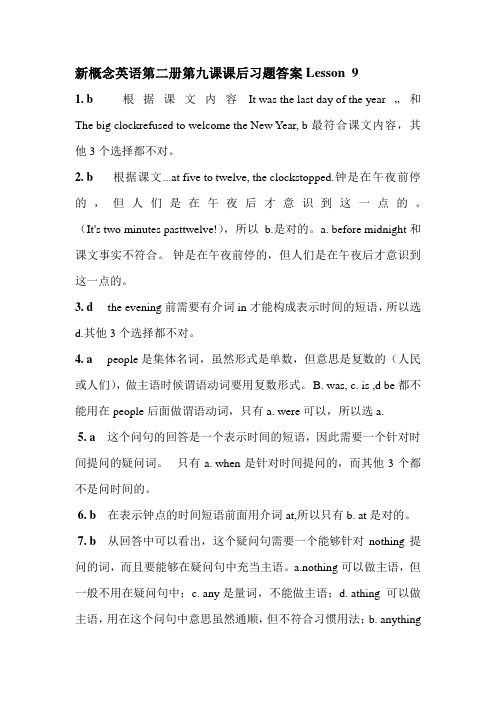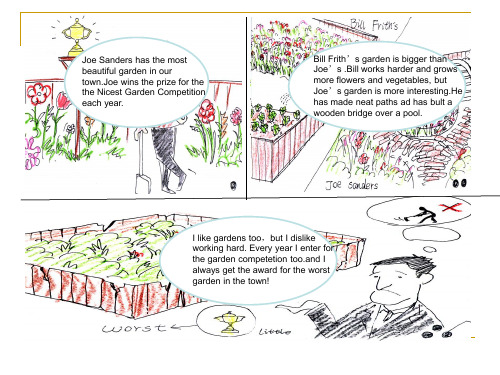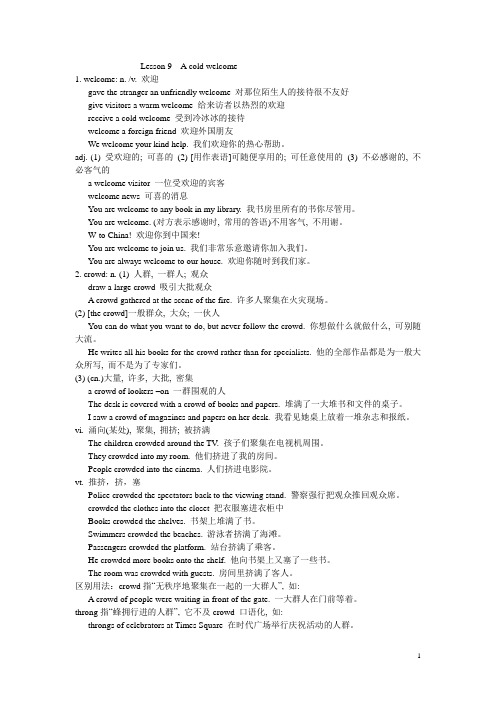新概念英语第二册Lesson9教案
新概念英语第二册Lesson9教案

新概念英语第二册L e s s o n9教案-CAL-FENGHAI.-(YICAI)-Company One1Lesson 9 A cold welcome 生词和短语☆welcome n./v.欢迎n. a cold welcome 冷遇v. welcome to+地点Welcome to China. Welcome home/back.adj. You are welcome.1.你是受欢迎的。
2.不用谢You are welcome to+地点☆crowd n.人群in the crowd: 在人群里 I spotted him in the crowd.a crowd of people:没有秩序的人群,拥挤的人群a group of people:有秩序的人群a large crowd of people/crowds of people:人山人海v. crowd 拥挤,挤满☆gather v.聚集people gather:人们聚集在一起,尤指自发性的聚集☆hand n.(表或机器的)指针minute/second/hour hand:分/秒/时针Which is the oldest --second hand因为second hand还有“二手的,旧的”意思wait for a moment/wait for a few seconds(secs.)secs.是seconds的缩写,在美国电影里经常能遇到☆shout v.喊叫=call out 大声喊叫;cry out:大声哭喊;scream:尖叫☆a cold welcome:冷遇cold:寒冷的;冷淡的cold fish:冷漠的人英语中有许多以动物代替人的词,如:lucky dog 幸运的人☆Town Hall:市政厅☆strikestrike the clockListen, the clock is striking.strike twelve 数字表示敲击的次数敲门用knock,敲钟用strikehit和strike在一定时候可以互换,都是一次性打,strike: hit hard beat:连续不断的打 beat drums:敲鼓☆in twenty minutes' time 20分钟之后根据时态判别in表示的含义:如果是将来式,in+段时间表示一段时间以后minutes' 名词所有格1.有生命的东西:my mother's; kit's; Tom's2.可以用来表达时间:an hour's time3.表示距离(在指路时常用)-How far is the school from here?-3 minutes' walk.☆分钟的介词:past:过了;to:没到...minutes past...前半小时...minutes to...后半小时☆The clock has stopped!现在完成时,强调过去动作导致的结果。
(完整版)新概念英语第二册第九课课后习题答案详解

新概念英语第二册第九课课后习题答案Lesson 91. b 根据课文内容 It was the last day of the year…和The big clockrefused to welcome the New Year, b 最符合课文内容,其他3个选择都不对。
2. b根据课文...at five to twelve, the clockstopped.钟是在午夜前停的,但人们是在午夜后才意识到这一点的。
(It's two minutes pasttwelve!),所以 b.是对的。
a. before midnight 和课文事实不符合。
钟是在午夜前停的,但人们是在午夜后才意识到这一点的。
3. d the evening 前需要有介词in才能构成表示时间的短语,所以选d.其他3个选择都不对。
4. a people 是集体名词,虽然形式是单数,但意思是复数的(人民或人们),做主语时候谓语动词要用复数形式。
B. was, c. is ,d be 都不能用在people 后面做谓语动词,只有a. were 可以,所以选a.5. a 这个问句的回答是一个表示时间的短语,因此需要一个针对时间提问的疑问词。
只有a. when是针对时间提问的,而其他3个都不是问时间的。
6. b在表示钟点的时间短语前面用介词at,所以只有b. at 是对的。
7. b从回答中可以看出,这个疑问句需要一个能够针对nothing提问的词,而且要能够在疑问句中充当主语。
a.nothing可以做主语,但一般不用在疑问句中;c. any 是量词,不能做主语;d. athing可以做主语,用在这个问句中意思虽然通顺,但不符合习惯用法;b. anything是不定代词,可以做主语,而且只能在疑问句中做主语,所以b.是对的。
8. d a. hit , b. beat, c. knock , d. strike这几个动词中都有“敲”,“打”,“击”的意思,但是只有strike 有“(钟表)敲鸣”,“报时”的含义,所以最佳选择是d.9. b 本句表示钟点的短"几点过几分"中只能用介词past,所以只有b. past 是正确的答案。
新概念英语二册Lesson9详细教案笔记

【New words and expressions】(7)★wele [ˈwelkəm] n./v./欢迎(e came e)(wele weled weled)eg.1.a cold wele 冷遇(n.)a warm wele 热烈欢迎(n.)2.Wele to Shanghai. 欢迎来上海。
(v.)The family weled us warmly at the airport.(v.) 这家人在机场热烈欢迎我们。
3.You are wele. 不用谢。
(adj.)I didn’t feel wele in the school.(adj.)在这所学校,我感觉不受欢迎。
★shout [ʃaʊt] v. 喊叫eg. We had to shout because the music was so loud.因为音乐这么大声,所以我们不得不叫起来。
(人体器官发出的动作,往往介词用at)eg. shout at sb. 向某人喊叫smile at sb. 向某人微笑look at sb. 看着某人wave at sb. 向某人挥手nod at sb. 向某人点头knock at the door 敲门kick at the stone 踢石头point at sb. 指着某人★refuse [rɪˈfjuːz] v. 拒绝●refuse sth. 拒绝某物eg. refuse a gift 拒绝一份礼物refuse an invitation 拒绝一份邀请refuse a request 拒绝一个请求●refuse to do sth. 拒绝做某事eg. I refuse to take a message for my friend.我拒绝为我朋友捎口信。
We refuse to cover such a long distance.(二册L:5)行过一段距离我们拒绝走这么长一段路。
They refuse to enter for this petition.他们拒绝参加这场比赛。
新概念英语第二册课件 (lesson 9 A cold welcome)

What happened? Nothing happened.
5. It was true that+从句 6. At that moment, everybody began to laugh and sing. at that moment = just then at the moment = now 现在, 此刻, 在此时
n. 欢迎;v. 欢迎
n. 门厅,走廊
n. 人群 v. 聚集 v. 敲,打 v. 发生;碰巧;偶然遇到
strike
happen shout refuse
[straɪk]
[‘hæpən] [ʃaʊt] [rɪ'fjuːz]
suddenly ['sʌdənli]
adv. 突然地;忽然
v. 喊叫
v. 拒绝
It will leave in five minutes'time.
in twenty (minutes' time) 名词所有格可省略
How far is the school from here?
3 minutes' walk. 三分钟路程。
4. We waited and waited, but nothing happened. waited and waited happen 等啊等啊, 强调动作的重复 (walked and walked;run and run) vi. 事情做主语, 事情发生 ……是一个事实 就在那时
4 Where had everyone gathered?
Yes, there was.
Under the Town Hall clock.
5 When would it strike twelve?
新概念英语第二册第9课Lesson9-A-cold-welcome

twelve, the clock stopped. The big minute
hand did not move.
Read together or one by one
• We waited and waited, but nothing happened.
• Suddenly someone shouted, “It's two minutes past twelve. The clock has stopped!”
引导时间壮语的介词:in /on /at/during/till &until
➢in:
1. 表示一天当中的某一段时间 e.g.:in the morning/ afternoon/ evening 2. 表示月份、年份: e.g.: in March/ September/ 2008 3. 表示季节: e.g.: in spring/ winter 4. 表示“在某段时间之内” e.g.: I always eat my breakfast in ten minutes. 5. 表示“…时间之后”, 与将来时连用 e.g.: The teacher will be arrive in ten days.
crowd of peo突p然le意识h到a,d突然g出a现thered under the Town
A rather worrying thought struck me.
Hall clock.
• It would strike twelve in twenty minutes’ time.
• Fifteen minutes passed and then at five to
Grammar Time
新概念英语第二册第九课课件

• I refused his invitation.
• I was politely refused.
• ①refuse sth. 拒绝某物
•
She refuses my love.
• ②refuse to do 拒绝做…
•
She refuses to marry me.
• refusal: n.
Key structures
1. welcome to
2. the Town Hall
3. a large crowd of
4. gather, together 5. in twenty minutes’ time 表示时间的介词
(in, on, at, about, around) 6. 不定代词 nothing, something, anything,
•1、我们的市场行为主要的导向因素,第一个是市场需求的导向,第二个是技术进步的导向,第三大导向是竞争对手的行为导向。 •2、市场销售中最重要的字就是“问”。 •3、现今,每个人都在谈论着创意,坦白讲,我害怕我们会假创意之名犯下一切过失。 •4、在购买时,你可以用任何语言;但在销售时,你必须使用购买者的语言。 •5、市场营销观念:目标市场,顾客需求,协调市场营销,通过满足消费者需求来创造利润。2021年11月3日星期三 2021/11/32021/11/32021/11/3 •6、我就像一个厨师,喜欢品尝食物。如果不好吃,我就不要它。2021年11月2021/11/32021/11/32021/11/311/3/2021 •7、我总是站在顾客的角度看待即将推出的产品或服务,因为我就是顾客。2021/11/32021/11/3November 3, 2021 •8、利人为利已的根基,市场营销上老是为自己着想,而不顾及到他人,他人也不会顾及你。2021/11/32021/11/32021/11/32021/11/3
新概念英语第二册第九课教案

Lesson 9 A cold welcome1. welcome: n. /v. 欢迎gave the stranger an unfriendly welcome 对那位陌生人的接待很不友好give visitors a warm welcome 给来访者以热烈的欢迎receive a cold welcome 受到冷冰冰的接待welcome a foreign friend 欢迎外国朋友We welcome your kind help. 我们欢迎你的热心帮助。
adj. (1) 受欢迎的; 可喜的(2) [用作表语]可随便享用的; 可任意使用的(3) 不必感谢的, 不必客气的a welcome visitor 一位受欢迎的宾客welcome news 可喜的消息You are welcome to any book in my library. 我书房里所有的书你尽管用。
You are welcome. (对方表示感谢时, 常用的答语)不用客气, 不用谢。
W-to China! 欢迎你到中国来!You are welcome to join us. 我们非常乐意邀请你加入我们。
You are always welcome to our house. 欢迎你随时到我们家。
2. crowd: n. (1) 人群, 一群人; 观众draw a large crowd 吸引大批观众A crowd gathered at the scene of the fire. 许多人聚集在火灾现场。
(2) [the crowd]一般群众, 大众; 一伙人You can do what you want to do, but never follow the crowd. 你想做什么就做什么, 可别随大流。
He writes all his books for the crowd rather than for specialists. 他的全部作品都是为一般大众所写, 而不是为了专家们。
新概念英语第二册第九课教案

新概念英语第二册第九课教案IMB standardization office【IMB 5AB- IMBK 08- IMB 2C】L e s s o n9A c o l d w e l c o m e 1. welcome: n. /v. 欢迎gave the stranger an unfriendly welcome 对那位陌生人的接待很不友好give visitors a warm welcome 给来访者以热烈的欢迎receive a cold welcome 受到冷冰冰的接待welcome a foreign friend 欢迎外国朋友We welcome your kind help. 我们欢迎你的热心帮助。
adj. (1) 受欢迎的; 可喜的 (2) [用作表语]可随便享用的; 可任意使用的 (3) 不必感谢的, 不必客气的a welcome visitor 一位受欢迎的宾客welcome news 可喜的消息You are welcome to any book in my library. 我书房里所有的书你尽管用。
You are welcome. (对方表示感谢时, 常用的答语)不用客气, 不用谢。
W-to China! 欢迎你到中国来!You are welcome to join us. 我们非常乐意邀请你加入我们。
You are always welcome to our house. 欢迎你随时到我们家。
2. crowd: n. (1) 人群, 一群人; 观众draw a large crowd 吸引大批观众A crowd gathered at the scene of the fire. 许多人聚集在火灾现场。
(2) [the crowd]一般群众, 大众; 一伙人You can do what you want to do, but never follow the crowd. 你想做什么就做什么, 可别随大流。
- 1、下载文档前请自行甄别文档内容的完整性,平台不提供额外的编辑、内容补充、找答案等附加服务。
- 2、"仅部分预览"的文档,不可在线预览部分如存在完整性等问题,可反馈申请退款(可完整预览的文档不适用该条件!)。
- 3、如文档侵犯您的权益,请联系客服反馈,我们会尽快为您处理(人工客服工作时间:9:00-18:30)。
Lesson 9 A cold welcome 生词和短语☆welcome n./v.欢迎n.a cold welcome 冷遇v.welcome to+地点Welcome to China.Welcome home/back.adj.You are welcome.1.你是受欢迎的。
2.不用谢You are welcome to+地点☆crowd n.人群in the crowd: 在人群里 I spotted him in the crowd.a crowd of people:没有秩序的人群,拥挤的人群a group of people:有秩序的人群a large crowd of people/crowds of people:人山人海v.crowd 拥挤,挤满☆gather v.聚集people gather:人们聚集在一起,尤指自发性的聚集☆hand n.(表或机器的)指针minute/second/hour hand:分/秒/时针Which is the oldest? --second hand因为second hand还有“二手的,旧的”意思wait for a moment/wait for a few seconds(secs.)secs.是seconds的缩写,在美国电影里经常能遇到☆shout v.喊叫=call out 大声喊叫;cry out:大声哭喊;scream:尖叫☆a cold welcome:冷遇cold:寒冷的;冷淡的cold fish:冷漠的人英语中有许多以动物代替人的词,如:lucky dog 幸运的人☆Town Hall:市政厅☆strikestrike the clockListen,the clock is striking.strike twelve 数字表示敲击的次数敲门用knock,敲钟用strikehit和strike在一定时候可以互换,都是一次性打,strike:hit hardbeat:连续不断的打 beat drums:敲鼓☆in twenty minutes' time 20分钟之后根据时态判别in表示的含义:如果是将来式,in+段时间表示一段时间以后minutes' 名词所有格1.有生命的东西:my mother's;kit's;Tom's2.可以用来表达时间:an hour's time3.表示距离(在指路时常用)-How far is the school from here?-3 minutes' walk.☆分钟的介词:past:过了;to:没到...minutes past...前半小时...minutes to...后半小时☆The clock has stopped!现在完成时,强调过去动作导致的结果。
看一般过去式,只要按字面意思理解即可。
看过去完成式,要读出潜在的意思。
☆at that moment=just then 就在那时at the moment=now 现在,此刻课文重点1.…a large crowd of people had gathered under the Town Hall clock. ……一大群人聚集在市政厅的大钟下面。
had gathered为过去完成时,表示过去某个时刻之前已经完成的动作。
(cf. 第14课语法)2.It would strike twelve in twenty minutes' time. 再过20分钟,大钟将敲响12下。
(1)这句话的时态为过去将来时。
(2)in+表示时间长度的短语可译为“……时间之后”,一般与将来时连用:Please wait a moment here. Jack will be back in a few minutes.请在此稍候。
杰克几分钟之后就回来。
(3)strike的基本含义是“打”、“击”:She struck the man in the face.她打了那人的脸。
当用于钟、乐器等东西时,它有“敲”、“弹”的含义:When I entered the room, the clock struck five.我进屋时,钟敲响了5点。
3.We waited and waited, but nothing happened. 我们等啊等啊,可情况没有变化。
动词 happen作“发生”、“出现”讲时,主语是物:Have you heard what happened to Sam this morning?你听说今天上午萨姆发生了什么事了吗?An interesting thing happened last night.昨晚发生了一件有趣的事。
4.The big clock refused to welcome the New Year. 那座大钟不愿意迎接新年。
这句话中的两个动词 refuse和welcome在一般情况下主语都是人。
我们可以说:Susan's friends welcomed her with flowers when she returned from abroad. 苏珊从国外回来时,她的朋友们用鲜花欢迎她。
在书上的这句话中,用大钟作主语是一种拟人手法。
本课语法1.引导时间状语的介词 in, on, at, during, till与 until(1)用in的时间短语有:表示一天中的某段时间:in the morning在早上in the afternoon/ evening 在下午/晚上表示月份、年份:in March 在3月in September 在9月in 1984 在1984年表示季节:in (the) spring 在春天in (the) winter 在冬天in+ 一段时间有两种含义。
它可以表示“在某段时间之内”,这时它可以与现在时、过去时或将来时连用,一般与完成某个动作有关:I always eat my breakfast in ten minutes.我总是在10分钟之内吃完早饭。
I finished the examination in two hours.我在两小时之内做完了考题。
另外,它还可以表示“……时间之后”,与将来时连用:Mother will be back in ten days.母亲10天后回来。
(2)用on的时间短语有:表示星期:on Monday 星期一on Friday 星期五on Monday morning/evening 在星期一早上/晚上表示日期:on June 1st 在6月1日on 23rd March 在3月23日(在书写日期时没有冠词,但在口语中则分别读为:on June the first, on the 23rd of March)表示星期+日期:on Monday, June 1st 在6月1日,星期一表示具体时间:on that day 在那一天on that evening 在那天晚上My brother's birthday is on August 12th.我哥哥的生日是8月12日。
(3)用at的时间短语有:表示确切的时间:at 10 o'clock 在10点钟at 5 'clock 在5点钟表示用餐时间:at lunch/ dinner time 在午饭/正餐时间at teatime 在茶点时间表示其他时刻:at noon/ night/ midnight在中午/夜里/半夜at this time 在这时Liz came to see me at ten/ teatime.莉兹10点/在茶点时来看我了。
(4)during后必须跟一个名词,可以指整个一段时间。
它有时可以用in替代:It was very hot during the summer.那年夏天很热。
He has phoned four times during the last half hour.在这半小时内他打了4次电话。
但在下面的例句中则不可用in替代during:I met him sometime during the week.我是在这一周的某天遇见他的。
During the whole winter it never snowed.整个冬季一直没下雪。
(5)from…till…指一段明确的时间:The tourist season runs from June till October.旅游季节从6月一直到10月。
(6)当所用动词只表示一个短暂的动作(如finish, leave)时,则只能在否定句中用till/ until:I won't leave till/ until Monday.我要到星期一才离开。
2.否定句的两种形式:not any与 no对于一般疑问句,可以有两种否定的回答:否定词no比not any的语气要强,但这两种否定的意义是相同的。
no可构成复合词nobody, none, nothing, nowhere; any可构成复合词anybody, anything 和anywhere:在一个句子中通常只能有一个否定词(包括never, hardly等词):而除黑人英语外一般不说:* I can't get no eggs.*。
